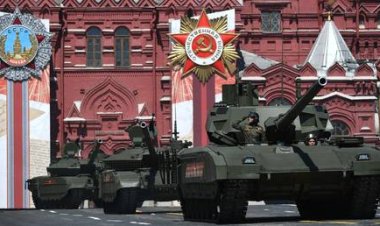Returning Home: Russian Films to Warm Your Heart
Discover legendary Soviet blockbusters, beloved Russian box office hits, and some hidden gems in our selection of six Russian films perfect for embracing the festive holiday spirit.

Over time, the allure of Hollywood holiday blockbusters tends to fade. Rewatching the same film can become tiresome, leading to a desire for something fresh and different. Here, we present six Russian and Soviet holiday films that offer a unique outlook on the festive season and its enchantment.
**‘The Irony of Fate, or Enjoy Your Bath!’**
It’s hard to envision New Year’s in Russia without ‘The Irony of Fate’. This film is arguably the nation’s most famous holiday movie, having become an emblem of the New Year celebration. Released nearly fifty years ago on January 1, 1976, it’s notable that this cinematic gem was created for television and never shown in theaters. It consists of two one-and-a-half-hour episodes that are always broadcast together as a single three-hour feature.
Interestingly, the tradition of airing this film on New Year’s Eve only began in 1994. Prior to that, while popular among holiday films, it hadn’t yet become a staple of the New Year’s viewing experience. Today, it’s nearly impossible to imagine the Russian holiday season without it.
The reasons for its widespread adoration are hard to pinpoint, as every scene contributes to its charm—removing any part would detract from its essence. Beyond the festive storyline, ‘The Irony of Fate’ delves into various social issues and possesses considerable depth. It combines romance, comedy, and satirical takes on a universal concern: housing difficulties.
The film opens with a witty portrayal of monotonous apartment blocks in major cities. It follows the journey of Evgeny Lukashin, a middle-aged doctor who traditionally visits the ‘banya’ with friends on New Year’s Eve and becomes quite inebriated. His equally drunk friends mistakenly send him to Leningrad that night, and upon arrival, Lukashin unknowingly enters an apartment identical to his own in Moscow. Thus, his unexpected love affair with a Leningrad schoolteacher begins.
Viewers often find it challenging to choose a side. Both protagonists are set to marry their respective partners when fate intervenes, bringing them together and leaving their former loves heartbroken. The film refrains from casting judgment, presenting the complex nature of life and the choices people make without a moral compass.
**‘Wizards’**
Structured like a classic Russian fairy tale, ‘Wizards’ tells the story of Ivan and his beloved Alyonushka, who is ensnared by villains seeking to keep them apart. Alyona transforms into an evil sorceress, and Ivan must confront these foes to break the spell. Two aspects contribute to this movie’s status as a cherished holiday classic in Russia.
Set in the early 1980s, coinciding with its release, the narrative unfolds in a remote institute working on magical research. The institute’s leaders are the antagonists, while Ivan and Alyonushka represent young and capable staff. The deputy's jealousy drives the plot as he tries to win Alyonushka’s affection. By reimagining a fairy tale in a contemporary context, the film was innovative for its time.
Additionally, the film critiques sluggish bureaucracy, oppression, and the rigidity of the system, common themes found in many Soviet movies. ‘Wizards’ artfully weaves musical comedy with familiar Russian fairy tales, allowing for an entertaining experience that also carries a satirical edge. The screenplay by the Strugatsky brothers, renowned for their science fiction, brings depth to this whimsical narrative, surprising audiences with its insightful commentary.
**‘Old New Year’**
Ironically, many forget that ‘Old New Year’ is indeed a holiday film. The concept originated in Russia in 1918 when the newly established Soviet government switched from the Julian to the Gregorian calendar, prompting a two-week shift in dates. This adjustment proved confusing for many, and the Orthodox Church continues to observe Christmas according to the Julian calendar on January 7. Thus, the ‘Old New Year’ takes place on the night of January 13-14.
Though interest in celebrating the Old New Year has waned over the years, it once provided a second opportunity for festive celebration, allowing people to say the New Year had truly arrived according to all calendars.
Reflecting its title, the events of ‘Old New Year’ take place on January 13-14, focusing on two families in the same building. One family comprises intellectuals with high moral standards and rich academic backgrounds, while the other is a successful, straightforward working-class household celebrating their housewarming.
The film offers a nuanced perspective on the mid-life crisis. Despite their affluence and success, characters in both families find themselves grappling with depression and uncertainty as the holiday festivities draw to a close, giving way to daily life. In this light, the old New Year transforms into a moment for introspection, urging characters to reassess their priorities.
**‘Evenings on a Farm Near Dikanka’**
Based on Nikolai Gogol’s story ‘The Night Before Christmas’ from his collection of short tales, ‘Evenings on a Farm Near Dikanka’ successfully brings classic literature to life on screen. This adaptation appeals to audiences of all ages due to two important factors.
Firstly, Gogol’s love for folklore shines through in his writing, merging fairy tale elements with mysticism within the narrative. Secondly, the directorial vision of Aleksandr Rou, celebrated for his fairy tale adaptations, breathes life into Gogol’s work, yielding a vibrant, enchanting film.
Set in a Ukrainian village, the story follows blacksmith Vakula, who is infatuated with Oksana, the daughter of a wealthy Cossack. Oksana imposes an impossible challenge: he must procure shoes from Empress Catherine the Great. Determined to win her heart, Vakula receives unexpected assistance from the devil, leading them on a venture to St. Petersburg in pursuit of the empress.
**‘Six Degrees of Celebration’**
Modern Russia has also produced memorable holiday films, one prime example being ‘Six Degrees of Celebration’, released in 2010. This anthology features eight interconnected stories set across various Russian cities, from Moscow to Yakutsk. Beyond its engaging narratives, the film offers an authentic glimpse into Russian life.
Despite its fragmented storytelling, a central theme connects the tales—people across different cities find surprising links through mutual friends, exemplifying the theory of six degrees of separation. The overarching message of the film is that holiday miracles stem from the actions of ordinary people rather than magical interventions.
Directed by six different filmmakers, the movie manages to maintain a cohesive storyline within the anthology format. A significant commercial success, it has since spawned a franchise with 12 films to date, though the original remains distinct in its charm.
**‘A Man in My Head’**
No holiday movie list would be complete without the hidden gem ‘A Man in My Head’. This underrated yet remarkable film is filled with unexpected twists and thought-provoking ideas.
The plot centers on Alyona, a bookstore owner whose life takes a bizarre turn after she injures her head while ice skating just before the holidays. Awakening in the hospital, she discovers a man’s voice echoing in her mind. Embracing this peculiar occurrence, Alyona uses her ‘inner man’ to navigate a series of challenges leading up to New Year’s, balancing dual perspectives to uncover the ‘golden mean’.
‘A Man in My Head’ uniquely illustrates the idea that humanity thrives on social interaction. By engaging with an external ‘observer’ and considering alternative viewpoints, Alyona navigates her problems more effectively. What begins as a fantastical tale culminates in a profound message—that life should never be viewed from a singular angle, and the ‘miracles’ we yearn for can indeed manifest on New Year’s Eve.
Thomas Evans for TROIB News












